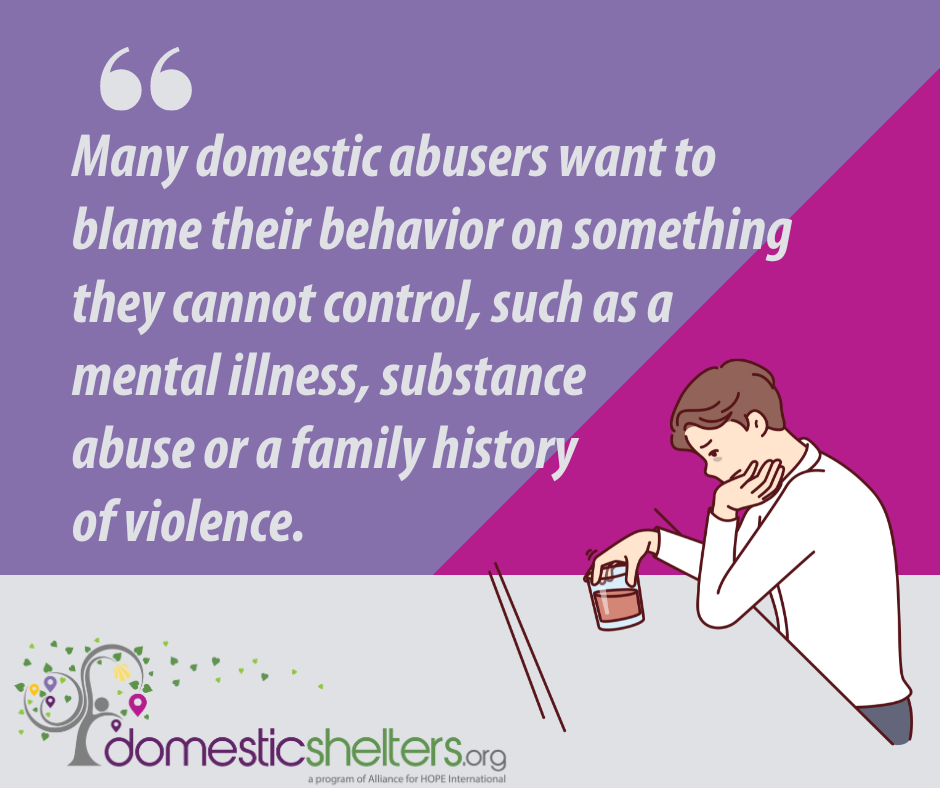1. Select a discrete app icon.

notes
Abuse Cannot Be Blamed on Alcoholism or Mental Illness
Domestic violence is not caused by drinking, drugs or having a mental disorder
- Feb 21, 2024


This piece was originally published in 2017. It was updated in 2024.
Abusers love excuses. They yelled at you because they were drunk. They hit you because they were hit as children. They’re abusive because they’re depressed. It’s not their fault. You should be more understanding.
Abusers will not take meaningful responsibility for their behavior. The first step to change is admitting that they are accountable for how they have treated you. Abusers who deny what they have done or who blame it on something or someone else—are not ready to change.
Domestic Violence, Alcohol and Drugs
Alcohol and drugs do not cause domestic violence. Abusing alcohol and drugs can make the episodes worse and more frequent, however. Abusers who complete substance abuse treatment may become less violent, but they are not apt to become less controlling. They need to address their controlling tendencies, too, or they will just become sober abusers. A victim-survivor, Kendra, illustrated this point for me when she said, “Bob came home from rehab acting like now everything was fine and I should just forgive the previous decade. In fact, he acted like I owed him bigtime since he had sacrificed his beloved booze ‘for my sake.’”
Christine Cocchiola, DSW, works with mothers who are victims of coercive control domestic abuse. She describes how much some mothers want to believe that abusers have no control over their actions. “Over and over again in my clinical work I see victims yearning for a simple solution. ‘If he would just stop drinking or drugging, the abuse would stop.’ Unfortunately, even when perpetrators complete treatment, the abuse rarely stops.”
Victim-survivors don’t want to “break up” their families or “abandon” the abuser, who claims to be suffering. They may have been told for so long that they are to blame for the relationship problems—they may wonder if this is true. Victim-survivors tend to be loyal and conscientious. But no matter how hard they try, they cannot “fix” the abuser. Abusers who truly want to change can take steps to accomplish this such as joining a batterer intervention program (individual counseling generally does not help). No one is required to stay by the side of abusers just because they claim they are taking steps to change.
Abuse and Mental Illness May Overlap: But Mental Illness Does Not “Cause” Abuse
Mental illness does not “cause” domestic abuse, either. People with certain mental illnesses may have poor interpersonal skills and out-of-control emotions. People who are psychotic may be off-kilter in every arena of their lives, including at home. Abusers are in control of their behavior if they behave well in public and turn into “a monster” only in private. They are choosing their timing and targets.
People who suffer from depression, anxiety disorders, panic disorders, substance use disorders and personality disorders are more likely to abuse their partners than people without these problems. But the mental illness does not cause them to strike out against their partners. Treatment for the mental illness will not necessarily make them less violent. And most people with mental illness do not harm others.
Many domestic abusers want to blame their behavior on something they cannot control, such as a mental illness, substance abuse or a family history of violence. We must remember that none of these conditions require the person to abuse their partner.
The excuses are lies. Domestic abusers choose to yell, hit, degrade, and dominate their partners because these acts help them achieve their goals. These goals might include power, sex, financial control or the illusion of a happy home. Abusers abuse because they can get away with it.
Why Do People Abuse Their Partners, Then?
If mental illness and addictions do not cause people to be abusive at home, what does? Abusers believe they have the right to control their partner by all means necessary, and many share common traits. Techniques of their abuse may include isolation, intimidation, monitoring, and physical, verbal, sexual, financial, and legal abuse.
“Victim-survivors” need to recognize that it is not their job to ensure the well-being of the perpetrator. Holding out hope that the abuse will end when these other problems are treated is not realistic, unfortunately,” adds Dr. Cocchiola.
Donate and change a life
Your support gives hope and help to victims of domestic violence every day.







